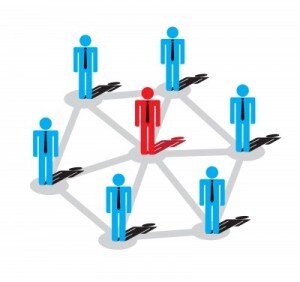Grow Leader-full Teams
I was gratified to hear the president of the American Management Association say, "We expect leader-like behavior from many many more people in today's organizations."And It turns out that the American military has begun to train leaders to lead by intent rather than lead by being prescriptive. The implication is that leadership is not a position, it is a way of being and it requires that we develop a more intimate relationship with ourselves and a better understanding of each other.In psychological theory, Carl Jung called this process of getting to know ourselves; of bringing our unconscious material to light, the process of individuation. It is the journey of human evolution.Individuation means that we embrace all that we are, (individually and collectively) and become brave enough to take off our defensive armor and go exploring like the hero of myth and story.Individuation builds our capacity to see ourselves and each other for all our attributes, complexities and creative gifts as well as our messier, perhaps less preferred character traits.This process of individuation also applies to the development of teams--to create leader-full teams. More on that shortly.The most well known team development model is: forming / storming / norming / performingMany teams get stuck and never move beyond the forming / storming phase. Why? A key contributor is that most of us walk around with an unconscious assumption that people see what we see, perceive what we perceive, hear what we hear, and think like we think. If they don't, they damn well should.We have to get beyond this to tap into the team's creativity and unlock the doors to innovation.
The implication is that leadership is not a position, it is a way of being and it requires that we develop a more intimate relationship with ourselves and a better understanding of each other.In psychological theory, Carl Jung called this process of getting to know ourselves; of bringing our unconscious material to light, the process of individuation. It is the journey of human evolution.Individuation means that we embrace all that we are, (individually and collectively) and become brave enough to take off our defensive armor and go exploring like the hero of myth and story.Individuation builds our capacity to see ourselves and each other for all our attributes, complexities and creative gifts as well as our messier, perhaps less preferred character traits.This process of individuation also applies to the development of teams--to create leader-full teams. More on that shortly.The most well known team development model is: forming / storming / norming / performingMany teams get stuck and never move beyond the forming / storming phase. Why? A key contributor is that most of us walk around with an unconscious assumption that people see what we see, perceive what we perceive, hear what we hear, and think like we think. If they don't, they damn well should.We have to get beyond this to tap into the team's creativity and unlock the doors to innovation. The most effective way I have found to address the "be like me" syndrome is to use the Enneagram system with teams.When people discover their Type and learn each other's Types, it opens the windows of perception. People begin to see the value of differences.I love seeing flashes of insight when team members "get" that people are different from them and perceive the world differently. In these precious moments, we learn to listen differently, "see" through a wide angle lens, and begin to appreciate differing world views and individual attributes.In these moments we begin to understand one another and to better understand ourselves.Then the real work begins. The team needs to develop its muscle to integrate the differences and leverage them for performance. Differences can tear us apart if we judge them or we can harness their strengths.Individuation (the process of differentiation and integration) needs to take place at both the individual and team level.
The most effective way I have found to address the "be like me" syndrome is to use the Enneagram system with teams.When people discover their Type and learn each other's Types, it opens the windows of perception. People begin to see the value of differences.I love seeing flashes of insight when team members "get" that people are different from them and perceive the world differently. In these precious moments, we learn to listen differently, "see" through a wide angle lens, and begin to appreciate differing world views and individual attributes.In these moments we begin to understand one another and to better understand ourselves.Then the real work begins. The team needs to develop its muscle to integrate the differences and leverage them for performance. Differences can tear us apart if we judge them or we can harness their strengths.Individuation (the process of differentiation and integration) needs to take place at both the individual and team level.
Our self-awareness and self-management can strengthen group effectiveness.
The brain is an open loop system; in other words, it is not just an organ that resides in our heads. We activate each other's triggers and moods catch like the flu.Think of a time you entered a group and were feeling positive and upbeat. After awhile, you noticed that people were complaining and their energy was lack luster and disengaged. How long did it take before you started feeling the same?Less aware individuals contribute to an unhealthy team environment. An unhealthy team environment can take down some of the healthiest individual players--or they leave.Individual development aids team development and vice-versa. They feed each other.The beauty of working with the Enneagram for team development is that it brings to light key underlying drivers for our habitual patterns of interacting, thinking, feeling and acting. It uncovers team strengths to be harnessed and liabilities to be managed. We get to know ourselves and each other in ways we never imagined.
If you can't see it and acknowledge it,you can't manage it
Once we surface some of our patterns, we can begin to unravel them and develop new ways of interacting and acting. We can take concrete steps to develop new ways of being--individually and as a team.Now we've entered Norming / Performing--until the new team members join, and then we start again ... Teams are a bit amoeba-like, constantly forming and reforming; reintegrating and differentiating. And so are we, if we are committed to learn, grow and evolve.Leader-full teams are teams made up of people who take responsibility for their work, their words and their actions. They are committed to grow and evolve. The person in authority (read, Boss), needs to create an environment where people can learn and grow and make a difference that matters; where each person can contribute their unique gifts and talents.I just heard Robert Tobias, American University speak about leadership development. He said:
There is a necessity for leaders to develop their inner life—to challenge themselves to become who they are and be relationally transparent—that is, to become authentic and to care.
__________________________________________I'd love to hear how you help grow leader-full teams. Please weigh in and join the conversation!

